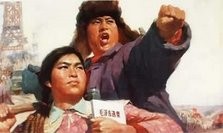After enduring six weeks of brain-wringing, critical thought-inducing, truth revealing English class, it is easy to feel at once empowered and powerless. We are armed with a clearer view of the world around us - we understand that there is a eternal custody battle for our thoughts, loyalties, and minds raging on between those who crave the money and power that comes from controlling our thoughts. But what should we do about it? What can we do about it? We can start by sharing what we know with others – by showing our friends how to see the things we couldn't, and teaching them how to think for themselves.
I, for one, find it impossible to read Thoreau’s “Civil Disobedience” without feeling a sense of guilt, or a need to do something to change the way things are. In his essay, Thoreau thoroughly describes our current situation:
There are thousands who are in opinion opposed to slavery and to the war, who yet in effect do nothing to put an end to them; who, esteeming themselves children of Washington and Franklin, sit down with their hands in their pockets, and say they know not what to do, and do nothing....They hesitate, and they regret, and sometimes they petition; but they do nothing in earnest and with effect. They will wait, well disposed, for others to remedy the evil, that they may no longer have it to regret (350).
Participating in half-hearted protests and waiting for someone else to take action is much easier, and safer, than being the one to make the first move. But what do we have to lose by showing our friends “The Persuaders” or watching “Merchants of Cool” with them? Our hard-earned reputation as a “cool kids”…a reputation that has been created for us and is controlled by the ones who view us as teenage consumer “targets?”
We live in America, the land of freedom and independence and morals of the highest standards. Er...maybe not. But for the most part, we are freer than many others out there. Unlike people in China, we don’t have to ask the government for permission to petition against its policies, and unlike Iraqis, we have the freedom to think how we want, read what we want, and write what we want. Blogging about the inconsistencies in our media, mailing the letters we wrote to representative Honda, sharing what we’ve learned with the people we care about or to those who will listen – simple acts that aren’t considered acts of civil disobedience in this country - these freedoms are ones we should take advantage of, because we can.
This “thinking for yourself” thing is like a muscle: it’s something that will atrophy and be rendered useless without exercise. Continuing to think for ourselves is the only fail-proof vaccine against thinking the thoughts of others. I don’t think any of us want to have our thoughts controlled by others, or be the mindless ballot-casting, money-dispensing suckers politicians and giant corporations see us as. Thinking about what we’ve learned and sharing this knowledge with others might not be the earth-shattering act of defiance we wanted to make, but it’s better than twiddling our thumbs at home, “...[waiting], well disposed, for others to remedy the evil, that [we] may no longer have it to regret” (350).
Works Cited:
Thoreau, Henry D. “Civil Disobedience.” 75 Readings Across the Curriculum: an Anthology. Ed. Chris Anson. New York: McGraw-Hill, 2008. 354–366.
Subscribe to:
Post Comments (Atom)

No comments:
Post a Comment